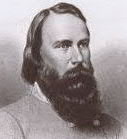wzh55
Posts: 188
Joined: 3/17/2001
From: Sacramento, CA USA
Status: offline

|
Attention Gil and ....
Completely Reworked Bio for Maj. Gen. DM Gregg
Words: 3,814
Maj. Gen. David McMurtrie Gregg (b. April 10, 1833, d. August 7, 1916) Born in Huntingdon, Pennsylvania, Gregg graduated from West Point in 1855 and was commissioned second lieutenant in the 2nd U.S. Dragoons (heavy cavalry). Gregg first tasted combat when he engaged 1,000 Indian warriors with 160 cavalry in the Washington Territory. Surrounded, Gregg managed a fighting retreat after 3 days with only light casualties. At the outbreak of the Civil War, Gregg was promoted to captain and ordered east to join the defensive force around Washington, D.C. In January 1862, Gregg was promoted to colonel of the 8th Pennsylvania Cavalry, fighting in the Peninsula Campaign, and distinguishing himself in the Seven Days Battle. Gregg was promoted to brigadier general at Fredericksburg, assuming command of his brigade when its commander, was killed by an shrapnel—his brigade’s only casualty of the battle. At the end of the Peninsular Campaign, his regiment was used to screen McCellan’s retreat. Later, in the Chancellorsville Campaign, he took part in the ill-conceived Stoneman’s Raid, where he showed combativeness, but eventually was repulsed. At the start of the Gettysburg Campaign, a surprise attack on J.E.B. Stuart at Brandy Station resulted in the largest cavalry engagement of the war. Gregg led two divisions to attack the flank and rear of the Confederates. The fighting was fierce, saber wielding, and hand-to-hand. The Confederates managed to repulse Gregg and though the battle was essentially a draw, it surprised and humiliated Stuart, and orders left behind provided valuable intelligence about Lee's intentions to invade the North. While Buford was initiating the Battle of Gettysburg on July 1, 1863, Gregg was still moving north with his new command, 2nd Division. His division arrived mid-day on July 2 and took up positions to protect the rear of the Union Army. On July 3, Stuart's forces collided with Gregg's division and Custer’s brigade. The battlefield rang with thundering charges and countercharges, cannon firing cannister, hand-to-hand saber duels and dismounted volleys. Both sides claimed victory, but Stuart was blocked from achieving his objectives in the Federal rear. Gregg became commander of the Cavalry Corps of the Army of the Potomac in January 1864, although not promoted to major general until August. His cavalry continued to skirmish with the Confederates under Stuart until, at the Battle of Yellow Tavern, Stuart was mortally wounded. Quiet and modest, universally liked and respected as a highly capable leader, his calm under battle was an amazement to all. Once, an enemy battery targeted him and cannonballs began to tear by him and staff. Calmly puffing on his pipe, he trotted to safety. When he saw his aides galloping to the rear, wide-eyed with terror, he called out, “Be calm, gentlemen—no occasion for haste!” Gregg unexpectedly resigned his commission in a letter dated January 25, 1865: “Having for more than three years been on uninterrupted service in the field, commanding cavalry in the Army of the Potomac, I at this time find such an imperative demand for my continued presence at home that my personal attention may be given to pressing private duties and business, that I can no longer defer action to secure my discharge from the service.” He settled in Reading, Pennsylvania, but apparently regretted leaving the army and applied for reinstatement in 1868, but the command he wanted went to his cousin. In 1874, he was appointed by President Grant to be U.S. Consul in Prague, but soon returned home. Gregg was active in civil affairs, speaking numerous times at the Gettysburg Battlefield. In 1891, he was elected Auditor General of Pennsylvania. Dying in Reading, Pennsylvania in 1916, he was one of the oldest war survivors of the state.
Revised ratings and abilities:
Leadership: 3
Tactics: 3
Initiative: 5
Command: 6
Cavalry: 7
Teaches: Fast / Brave / Night Owls / Flankers
_____________________________
Bill Hawthorne
|
 Printable Version
Printable Version








 New Messages
New Messages No New Messages
No New Messages Hot Topic w/ New Messages
Hot Topic w/ New Messages Hot Topic w/o New Messages
Hot Topic w/o New Messages Locked w/ New Messages
Locked w/ New Messages Locked w/o New Messages
Locked w/o New Messages Post New Thread
Post New Thread